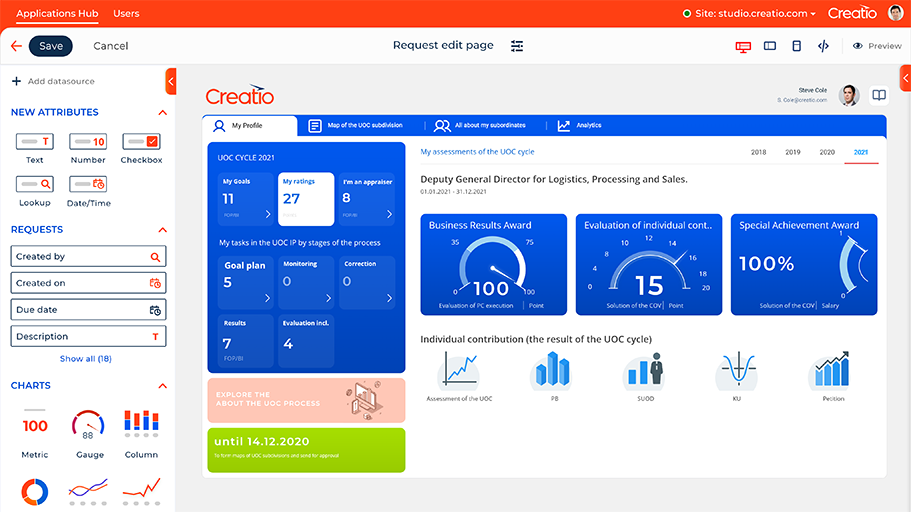Nurturing citizen developers allows a company to grow faster, more efficiently, and more reliably. Citizen developers don’t work in the IT department. Instead, they support their own functional department. They use a no-code platform like Creatio Atlas to build applications for their coworkers and clients. They assist management with analysis, measurement, and recommendations to improve department performance. Also, they can boost company performance by helping integrate all the data flowing around the company. In summary, citizen developers can help your business evolve more rapidly and reliably.
![Citizen developers document processes and build applications [image]](https://e6-solutions.com/wp-content/uploads/e6-220218-citizen.jpg)
Citizen developers grow from process analysts
The ideal candidate to become a citizen developer is a business analyst. On the other hand, you can recruit anyone who cares about “how the work gets done.” Professional business analysts are trained to collaborate with other employees in finding the best processes to satisfy your customers. They document existing processes and consult with managers about opportunities to improve. Usually, they track performance metrics and keep an eye out for bottlenecks and inefficiencies. Finally, business analysts build bridges between the IT department, the application users, and managers.
A soaring demand for digital workflows and business applications coincides with a relative shortage of developers with full coding skills. There are, however, literally billions of knowledge workers that understand their own workflows and processes and know what applications they would like to build and how those applications should perform. A platform like 8.0 Atlas is designed to unleash that non-developer talent and make it possible to create applications in hours rather than weeks or months.
MarTech: Creatio launches major update to its no code platform, 22-Feb-8 by Kim Davis
Freedom to build and upgrade applications without programming skills
Creatio has just released a new version of their platform for business process management. Atlas (version 8) offers a new, more intuitive environment for managing and automating processes. No coding is required. Instead, users access a library of tools, data models, and pre-existing processes. So, with Atlas, they can drag and drop the components they need. Also, connectors are supplied to enable workflows. Applications are housed in the platform where their status can be modified. After testing, users are invited to access the application.
Create applications and change processes on the fly
Since companies don’t want to make rash changes, a powerful no-code platform like Creatio Atlas creates a safe playground. Now employees can collaborate to visualize new ways to work. Enterprise workflows are charted. Different people can test the application by accessing the Application Hub. When the application is ready, then a new release can be carefully managed. The speed of change is based on the ingenuity of your people, not a project queue in the IT department. Gartner estimates that by 2025, 70% of new applications developed by enterprises will use low- or no-code technology.
Citizen developers find new efficiencies and lower costs
Creatio Atlas sends the management of processes and applications to the people who use them. A citizen developer is embedded in the department that uses the process. Because he or she is a member of that team, everyone has better insight into team capabilities and data needs. Expensive programming skills can be focused on other enterprise-wide needs. Another way Creatio Atlas saves money is by housing all components in a library where they can be shared to save labor. In addition to your company’s own components, over 750 apps, templates, and connectors are available in the Creatio Marketplace. Additionally, the AI (machine learning) assistance reduces learning time.
Empower your teams with the right data at the right time
Data managers can build models with various levels of access so that data flows around the company. These models are accessible to the citizen developers using the No-Code Designer. Of course, access rights can be set for every type of user. Both SOAP and REST services are available for integration. Now your company can actually push the best data around to more users.

Creatio’s new Freedom UI configurator accelerates the design process
The Freedom UI Designer offers your company the opportunity to empower more people to design brand-compliant and responsive pages and applications. No coding skills are required, and the artificial-intelligent engine learns from your company’s systems to suggest brand-appropriate designs. Citizen developers find a library of predefined templates, widgets and views. The output complies with the Web Content Accessibility Guidelines (WCAG 2.1). Finally, the full adaptability to different devices delivers a better user experience.
Discover a more reliable way to evolve your business
Innovation can be risky, but Creatio Atlas helps everybody in your company share their ideas around data and processes. An application built by one department can inspire another group. And best of all, the technology is available for copying and improving the applications without expensive training.

![Citizen developers document processes and build applications [image]](https://e6-solutions.com/wp-content/uploads/e6-220218-citizen-featured.jpg)